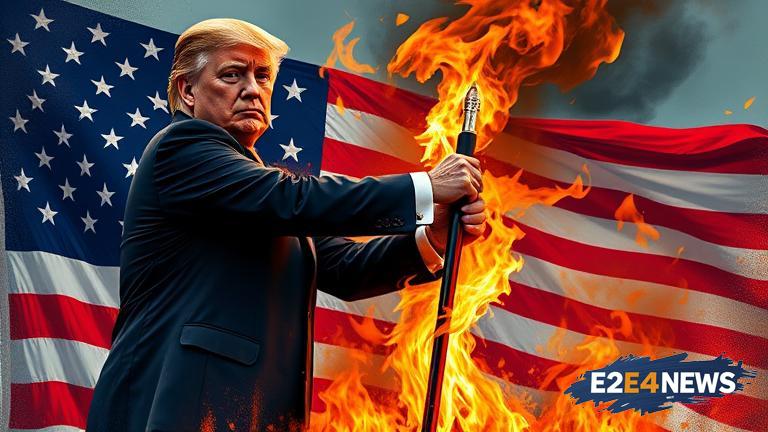In a move that has sparked intense debate and controversy, President Trump has signed an executive order making flag burning a federal crime. The order, which was signed on August 25, 2025, has been met with widespread criticism from civil liberties groups and free speech advocates, who argue that it infringes upon the fundamental right to freedom of expression. The order states that anyone found guilty of burning or desecrating the American flag will face severe penalties, including fines and imprisonment. The move has been seen as a attempt by the President to assert his patriotic credentials and appeal to his conservative base. However, opponents of the order argue that it is a clear infringement upon the First Amendment, which guarantees the right to free speech and peaceful protest. The American Civil Liberties Union (ACLU) has already announced plans to challenge the order in court, arguing that it is unconstitutional and violates the principles of free speech. The issue of flag burning has long been a contentious one in American politics, with many conservatives arguing that it is a form of disrespect to the nation and its values. However, others argue that it is a legitimate form of protest and a fundamental right to freedom of expression. The Supreme Court has previously ruled that flag burning is a form of protected speech, and it remains to be seen how the court will respond to the President’s executive order. The order has also sparked a wider debate about the limits of free speech and the role of government in regulating forms of expression. Many have argued that the order is a form of censorship, and that it sets a dangerous precedent for the suppression of dissenting voices. Others have argued that the order is necessary to protect the nation’s values and symbols, and that it is a legitimate exercise of presidential power. The issue is likely to be highly contentious in the coming weeks and months, with many expecting a lengthy and complex legal battle. The President’s supporters have hailed the order as a victory for patriotism and national pride, while opponents have condemned it as a attack on fundamental freedoms. The order has also sparked a wider debate about the role of the President in shaping American culture and values. Many have argued that the President is overstepping his authority, and that the order is a form of cultural authoritarianism. Others have argued that the President has a legitimate role in promoting American values and symbols, and that the order is a necessary step to protect the nation’s heritage. The issue of flag burning has long been a divisive one in American politics, and it remains to be seen how the controversy will play out in the coming weeks and months. The President’s executive order has sparked a national conversation about the limits of free speech, the role of government in regulating forms of expression, and the importance of protecting national symbols and values. As the debate continues to unfold, it is clear that the issue of flag burning will remain a highly contentious and deeply divisive one in American politics. The President’s order has also sparked a wider debate about the importance of patriotism and national pride, and the role of government in promoting these values. Many have argued that the order is a necessary step to protect the nation’s values and symbols, while others have argued that it is a form of nationalism that undermines the principles of freedom and democracy. The issue is likely to be highly contentious in the coming weeks and months, with many expecting a lengthy and complex legal battle. The President’s supporters have hailed the order as a victory for patriotism and national pride, while opponents have condemned it as a attack on fundamental freedoms. The order has also sparked a wider debate about the role of the President in shaping American culture and values, and the limits of presidential power. Many have argued that the President is overstepping his authority, and that the order is a form of cultural authoritarianism. Others have argued that the President has a legitimate role in promoting American values and symbols, and that the order is a necessary step to protect the nation’s heritage. The issue of flag burning has long been a divisive one in American politics, and it remains to be seen how the controversy will play out in the coming weeks and months.
